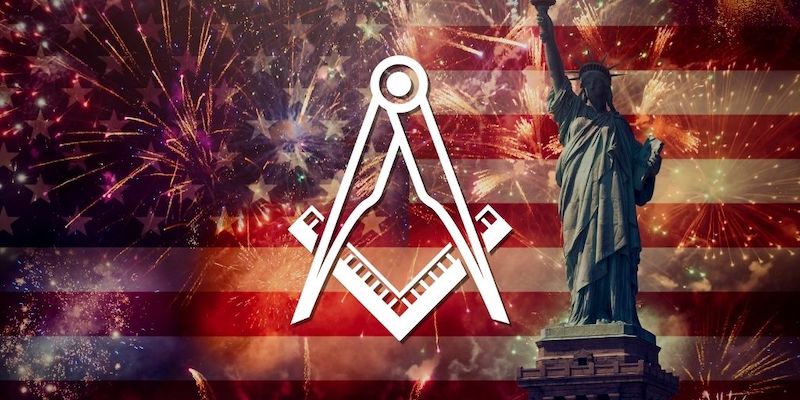The 4th of July stands as a pivotal date in American history, marking the moment when the Declaration of Independence was adopted in 1776.
This document not only proclaimed the colonies’ independence from British rule but also laid the groundwork for the principles of democracy and individual rights that define the United States today.
However, behind this milestone in American history lies a lesser-known yet significant connection to Freemasonry, a centuries-old fraternity whose principles and members played crucial roles in shaping the nation’s founding documents and ethos.
TLDR: This date is important in Freemasonry because Masons have influenced greatly the Declaration, proving once and for all that some of the Founding Fathers of the United States were, in fact, Freemasons.

The Historical Intersection: Freemasonry and the Declaration of Independence
The signing of the Declaration of Independence on July 4, 1776, was not merely a political act but a philosophical declaration steeped in Enlightenment ideals and Masonic principles.
Several of the Declaration’s key architects were Freemasons, including Benjamin Franklin, Thomas Jefferson, and John Hancock.
These men, influenced by their membership in Masonic lodges, infused the Declaration with principles such as equality, liberty, and the pursuit of happiness – values that resonate deeply within both Freemasonry and American democracy.
The Masonic influence on the Declaration extends beyond its drafters to its signatories. Of the 56 signers, at least nine are confirmed Freemasons, with others strongly suspected of membership.
This Masonic presence underscores the fraternity’s significant role in shaping the nation’s foundational document and ideals.
Masonic Influence on American Governance: Shaping the Constitution

The impact of Freemasonry on American governance extends beyond the Declaration of Independence to the drafting of the United States Constitution.
Freemasons such as George Washington, James Madison, and Benjamin Franklin played instrumental roles in crafting this enduring document.
Their Masonic principles of democratic governance, checks and balances, and individual freedoms laid the groundwork for a robust system of government that has stood the test of time.
The Constitution, ratified in 1787, reflects the Masonic commitment to justice, equality, and the rule of law. These principles, deeply rooted in Freemasonry, continue to shape American jurisprudence and civic life, reinforcing the fraternity’s enduring legacy in American governance.
Legacy of Values: Freemasonry and American Society
Beyond its influence on founding documents, Freemasonry has left an indelible mark on American society through its core values of brotherhood, mutual respect, and charitable works.
Since its inception, Freemasonry has emphasized the importance of moral integrity, ethical conduct, and community service, guiding members to uphold these principles in their personal and professional lives.
In communities across the United States, Freemasons have contributed to charitable causes, supported education initiatives, and promoted civic engagement.
These efforts reflect the fraternity’s commitment to improving society and fostering a spirit of philanthropy and goodwill.
Moreover, Freemasonry’s commitment to tolerance and inclusivity has helped shape a diverse and inclusive American society.
From its earliest days, Freemasonry welcomed men of different backgrounds and beliefs, fostering a sense of unity and mutual respect among its members. This commitment to diversity continues to resonate within the fraternity and serves as a model for building harmonious communities based on shared values and common purpose.
As Americans gather each year to celebrate Independence Day on the 4th of July, they not only commemorate the nation’s birth but also honor Freemasonry’s enduring legacy in shaping America’s foundational principles and values.
The fraternity’s contributions to the Declaration of Independence, Constitution, and broader societal fabric highlight its profound impact on American history and governance.
Through its commitment to brotherhood, charity, and moral virtue, Freemasonry continues to inspire generations of Americans to uphold the ideals of liberty, equality, and justice for all.
Thus, the 4th of July serves as a poignant reminder of the intertwined histories of Freemasonry and the United States, united in their pursuit of a more perfect union founded on principles of freedom and fraternity.
READ NEXT: Freemasonry & The American Revolution
great site
I love your web site.
Am a lonely brother Past master lodge 455 Little current Ontario.
Looking to hook up with others who have traveld to the east!
Others who love the MH and GATU
I am a menber in good standing of my Mother Lodge, also a member of the RAM in Espanola,
a member of Alpha Council and a member of the Knights Templar.
Any brother looking to meet another brother, I am here, 70 years old and all alone in Germany as a forgotten Canadian.
Extravagant claims are sometimes made in connection with the Masonic membership of the signers of the Declaration of Independence.
There were fifty-six signers of the document.
There is satisfactory evidence to prove conclusively that eight were Masons. Twenty-four others are sometimes claimed as Masons, but evidence submitted is not completely satisfactory, being based of hearsay and “tradition”, rather than documents.
There are twenty-four signers who have never been claimed as Masons.
The best answer the question is as follows: “Scholars have proved that eight Signers were Masons. As many as thirty may have been.”